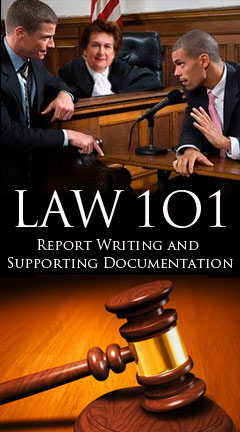Report Writing and Supporting Documentation
This is an archive page that is no longer being updated. It may contain outdated information and links may no longer function as originally intended.

Learning Objectives
After completing Report Writing and Supporting Documentation the user should:
- Know that laws differ according to jurisdictions.
- Recognize the importance of checking with attorneys on appropriate legal issues in applicable jurisdictions.
- Know how to prepare reports, pretrial training documents, and testimony in layman's language to avoid ambiguity or misunderstanding.
- Determine what is required in the case file by consulting quality assurance (QA) and quality control (QC) standards of various accrediting bodies.
- Ensure that all supporting documentation is maintained in the case file.
- Know the laboratory's policy for disposition of evidence.
- Recognize that the scientist is responsible for documenting work done to prepare samples for outside testing.
- Examine notification requirements regarding sample consumption, retention and disposition.
- Ensure the specifics of all relevant testing dates.
- Realize the importance of studying any applicable standards of performance from the:
- American Society for Crime Laboratory Directors (ASCLD) — ASCLD's Code of Ethics
- American Bar Association (ABA) — ABA Model Rules for Professional Conduct
- International Organization for Standardization (ISO) — ISO Standards
- American Society for Testing and Materials (ASTM)
- American Academy of Forensic Sciences (AAFS) — AAFS Code of Ethics,
- American Society for Crime Laboratory Directors — ASCLD Guiding Principles
- International Association for Identification (IAI) — IAI Standards of Ethical Conduct
- American Board of Criminalistics (ABC) — ABC's Rules of Professional Conduct
- Other professional association ethics codes
Results of laboratory analyses are usually preserved in analytical reports written by the forensic expert once all tests are completed. The reports are then submitted to the requesting agency or attorney. Copies of these reports may be made available to opposing counsel, investigators and others involved in the case.


